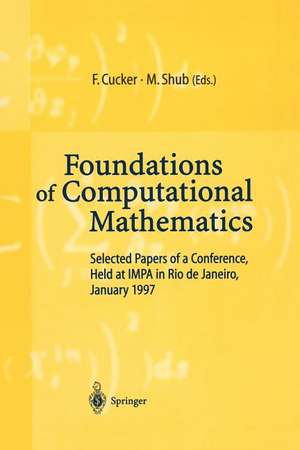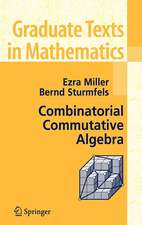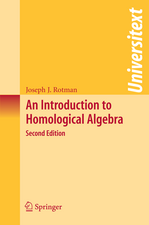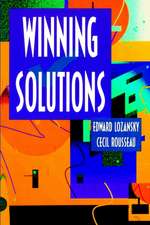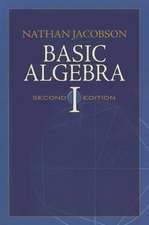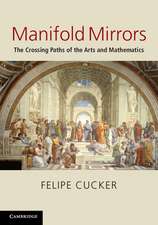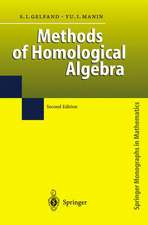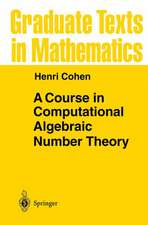Foundations of Computational Mathematics: Selected Papers of a Conference Held at Rio de Janeiro, January 1997
Editat de Felipe Cucker, Michael Shuben Limba Engleză Paperback – 16 dec 1996
Preț: 648.56 lei
Preț vechi: 763.01 lei
-15% Nou
Puncte Express: 973
Preț estimativ în valută:
124.10€ • 129.58$ • 102.48£
124.10€ • 129.58$ • 102.48£
Carte tipărită la comandă
Livrare economică 15-29 aprilie
Preluare comenzi: 021 569.72.76
Specificații
ISBN-13: 9783540616474
ISBN-10: 3540616470
Pagini: 464
Ilustrații: XV, 441 p. 11 illus.
Dimensiuni: 155 x 235 x 24 mm
Greutate: 0.64 kg
Ediția:Softcover reprint of the original 1st ed. 1997
Editura: Springer Berlin, Heidelberg
Colecția Springer
Locul publicării:Berlin, Heidelberg, Germany
ISBN-10: 3540616470
Pagini: 464
Ilustrații: XV, 441 p. 11 illus.
Dimensiuni: 155 x 235 x 24 mm
Greutate: 0.64 kg
Ediția:Softcover reprint of the original 1st ed. 1997
Editura: Springer Berlin, Heidelberg
Colecția Springer
Locul publicării:Berlin, Heidelberg, Germany
Public țintă
ResearchDescriere
This book contains a collection of articles corresponding to some of the talks delivered at the Foundations of Computational Mathematics conference held at IMPA in Rio de Janeiro in January 1997. Some ofthe others are published in the December 1996 issue of the Journal of Complexity. Both of these publications were available and distributed at the meeting. Even in this aspect we hope to have achieved a synthesis of the mathematics and computer science cultures as well as of the disciplines. The reaction to the Park City meeting on Mathematics of Numerical Analy sis: Real Number Algorithms which was chaired by Steve Smale and had around 275 participants, was very enthusiastic. At the suggestion of Narendra Karmar mar a lunch time meeting of Felipe Cucker, Arieh Iserles, Narendra Karmarkar, Jim Renegar, Mike Shub and Steve Smale decided to try to hold a periodic meeting entitled "Foundations of Computational Mathematics" and to form an organization with the same name whose primary purpose will be to hold the meeting. This is then the first edition of FoCM as such. It has been organized around a small collection of workshops, namely - Systems of algebraic equations and computational algebraic geometry - Homotopy methods and real machines - Information-based complexity - Numerical linear algebra - Approximation and PDEs - Optimization - Differential equations and dynamical systems - Relations to computer science - Vision and related computational tools There were also twelve plenary speakers.
Cuprins
Computing Roadmaps of Semi-algebraic Sets on a Variety (Extended Abstract).- Essentially Smooth Lipschitz Functions: Compositions and Chain Rules.- Junction Detection and Filtering.- Recognition in Hierarchical Models.- Continuity ?—Algebras (Extended Abstract).- Condition Number Analysis for Sparse Polynomial Systems.- Residues in the Torus and Toric Varieties.- Piecewise Smooth Orthonormal Factors for Fundamental Solution Matrices.- Algorithms for computing finite semigroups.- Extended Grzegorczyk Hierarchy in the BSS Model of Computability.- Affine-Invariant Symmetry Sets.- On the Qualitative Properties of Modified Equations.- Numerical Methods on (and off) Manifolds.- On One Computational Scheme Solving the Nonstationary Schrödinger Equation with Polynomial Nonlinearity.- Newton Iteration Towards a Cluster of Polynomial Zeros.- Szemerédi’s Regularity Lemma for Sparse Graphs.- Questions on Attractors of 3-Manifolds.- A Trust-Region SLCP Model Algorithm for Nonlinear Programming.- On the height used by additives BSS machines.- The Space Complexity of Elimination Theory: Upper Bounds.- Global Stochastic Recursive Algorithms.- Dynamical Recognizers: Real-time Language Recognition by Analog Computers (Extended Abstract).- Solving special polynomial systems by using structured matrices and algebraic residues.- Numerical Integration of Differential Equations on Homogeneous Manifolds.- A Convergence proof of an Iterative Subspace Method for Eigenvalues Problems.- Regularity of Minimizers of the Mumford-Shah Functional.- Tests and Constructions of Irreducible Polynomials over Finite Fields.- Numerical Linear Algebra in Optical Imaging.- Explicit symplectic integration of rod dynamics.- Toric Laminations, Sparse Generalized Characteristic Polynomials, and a Refinement of Hilbert’s Tenth Problem.- Finite-Dimensional Feedback Control of a Scalar Reaction-Diffusion Equation via Inertial Manifold Theory.- Computational aspects of jacobian matrices.- Rigid body dynamics and measure differential inclusions.- Linear decision lists and partitioning algorithms for the construction of neural networks.- Ill-Posedness and Finite Precision Arithmetic: A Complexity Analysis for Interior Point Methods.- Iterated Commutators, Lie’s Reduction Method and Ordinary Differential Equations on Matrix Lie Groups.
Textul de pe ultima copertă
This book contains a collection of articles corresponding to some of the talks delivered at the Foundations of Computational Mathematics (FoCM) conference at IMPA in Rio de Janeiro in January 1997. FoCM brings together a novel constellation of subjects in which the computational process itself and the foundational mathematical underpinnings of algorithms are the objects of study.
The Rio conference was organized around nine workshops: systems of algebraic equations and computational algebraic geometry, homotopy methods and real machines, information based complexity, numerical linear algebra, approximation and PDE's, optimization, differential equations and dynamical systems, relations to computer science and vision and related computational tools. The proceedings of the first FoCM conference will give the reader an idea of the state of the art in this emerging discipline.
The Rio conference was organized around nine workshops: systems of algebraic equations and computational algebraic geometry, homotopy methods and real machines, information based complexity, numerical linear algebra, approximation and PDE's, optimization, differential equations and dynamical systems, relations to computer science and vision and related computational tools. The proceedings of the first FoCM conference will give the reader an idea of the state of the art in this emerging discipline.
